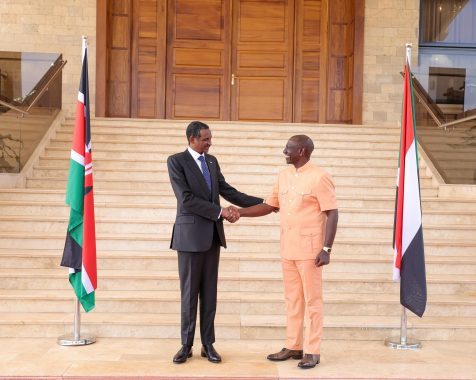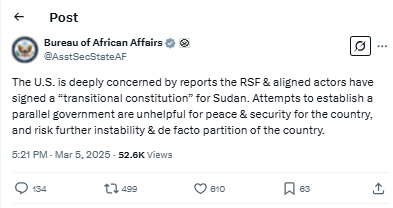US raises concerns after RSF sign transitional constitution for Sudan

The US has raised concerns after Sudan’s Rapid Support Forces (RSF) and allied groups signed a transitional constitution for Sudan.
The transitional constitution was signed on Tuesday, March 4, 2025, taking them a step closer to setting up a parallel government.
The Department of State’s Bureau of African Affairs, in a statement issued on Wednesday, March 5, 2025, raised the concerns, saying that attempts to establish a parallel government are unhelpful for peace and security for the country and risk further instability and de facto partition of Sudan as a country.
“The U.S. is deeply concerned by reports that the RSF & aligned actors have signed a “transitional constitution” for Sudan. Attempts to establish a parallel government are unhelpful for peace & security for the country and risk further instability & de facto partition of the country,” the statement read.
The new constitution formally establishes a government and maps out what it describes as a federal, secular state, split into eight regions.
It provides for a bill of basic rights, giving regions the right to self-determination should certain conditions, chief among them separation of religion and the state, not be met.
It also calls for a single national army, with the signatories as the “nucleus.”. Elections are mentioned as an outcome of the transitional period, without any fixed timetable.
Signatories include the powerful and secular-minded SPLM-N, which controls vast areas in Sudan’s South Kordofan, and other smaller groups.

Kenya-Sudan diplomatic spat
RSF and its allies had earlier signed a charter in Nairobi, sparking a diplomatic row between Kenya and Sudan.
Days after the RSF signed the charter in Nairobi, Sudan has continued to criticise President William Ruto’s administration, accusing it of undermining its sovereignty.
In a statement on Monday, March 3, 2025, Sudan’s Ministry of Foreign Affairs sustained its offensive, describing Kenya’s stance as an irresponsible approach.
The Sudanese Foreign Affairs Ministry added that allowing RSF to sign the charter in Nairobi risks sliding Kenya into the rogue state category.
While reprimanding Kenya, Sudan noted that it had received worldwide support calling for the protection of its independence and sovereignty.
According to the East African nation, Saudi Arabia, Egypt, and Kuwait are among the countries supporting their position in this simmering diplomatic row.
“The Ministry commends the strong principled stances expressed by the Arab Republic of Egypt, the Kingdom of Saudi Arabia, the State of Qatar, the State of Kuwait, and the African member states of the Security Council: Algeria, Somalia, and Sierra Leone, as well as the positions of the other Council members Russia, China, the United States, Britain, and Guyana, and the statement issued by Turkey.
“These clear positions affirm that the irresponsible approach of the Kenyan presidency, by embracing the genocide militia and seeking to legitimize its unprecedented crimes, is isolated both internationally and domestically, placing Kenya in the category of a rogue state defying international norms,” the statement read in part.
Kenya’s position
After RSF and other affiliate alliances signed their charter in Nairobi, sparking diplomatic discourse, Kenya immediately released a statement expressing its willingness to support both parties in finding a long-lasting solution to ending conflict in Sudan.
Prime Cabinet Secretary, who doubles up as Foreign Affairs CS, Musalia Mudavadi further defended President Ruto, insisting that he was bipartisan in the whole process and that the country was willing to help end the Sudan conflict.
“We note that this is not the first time groups in Sudan have sought solutions to their crisis by leveraging the good offices of neighbouring countries. Indeed, in January 2024, parties and stakeholders to the Sudanese conflict met in a neighbouring country to chart a way forward on inclusive dialogue and return to civilian rule,” Mudavadi’s stated.
“Rapid Support Forces (RSF) and Sudanese civilian groups’ tabling of a roadmap and proposed leadership in Nairobi is compatible with Kenya’s role in peace negotiation, which enjoins her to provide non-partisan platforms to conflict parties to seek resolutions.“













